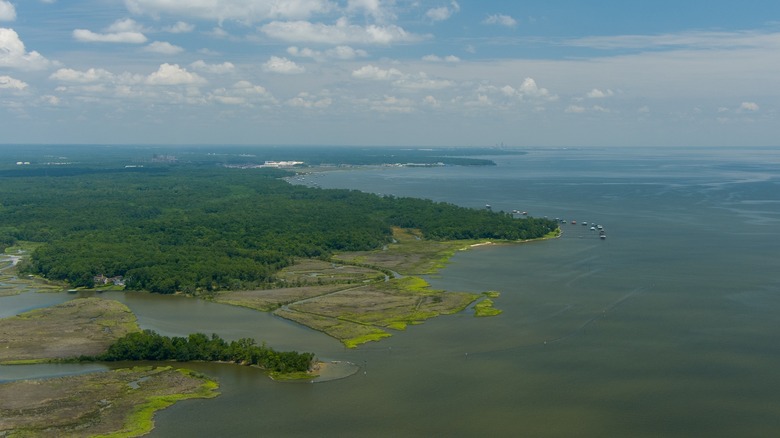What Happened To The Captain Of The Last Known Slave Ship?
In 2018, the remnants of what was believed to be the last known slave ship were discovered (via The New York Times). Although there were doubts, Smithsonian Magazine writes that in 2019, researchers concluded that this was indeed the long-lost vessel known as the Clotilda. Due to what was been described as a "bomb cyclone," the Clotilda resurfaced in Alabama's Mobile River. Now, The Guardian reports that a documentary about the ship titled "Descendant" has been released on Netflix. The film delves into how the Clotilda altered history and how its effects are still felt today.
In 1860, the Clotilda sailed from Mobile, Alabama to West Africa. Its purpose, per another article from The New York Times, was to bring slaves from Benin (which was then called Ouidah or Wydah) to the United States. Slavery may have been legal during this time but importing slaves into the country was strictly prohibited. However, this did not deter plantation owner Timothy Meaher (per another article from Smithsonian Magazine). Meaher was up for the challenge and decided to use the Clotilda to illegally transport slaves into the country. Emerging Civil War states that Meaher hired his friend, 37-year-old William Foster, to be the captain of the ship.
Captain William Foster's journey to Africa
According to Emerging Civil War, Foster was originally from Nova Scotia. He had moved to Mobile in 1843 to work as a shipbuilder. In March 1860, The Mobile Public Library reports that Foster and his 12-person crew boarded the Clotilda and left on their journey to Benin. His diary notes that they took with them 80 casks of alcohol, 30 barrels of beef, $9,000 in gold to purchase the slaves, and more. That said, the crew did not know that they were going to Africa to bring back slaves to Alabama. They likely would not have joined the journey as the consequences for being caught were severe and included high fines and years of jail time.
The Mobile Public Library states that the Clotilda sailed through Bermuda and Cape Verde, amongst other places, until it eventually arrived in Benin on May 15. Foster wrote that they encountered a few Portuguese man o' war's on the journey and that at one point, the ship needed to be repaired by the crew. Once they purchased the slaves, Foster and his crew returned to sea. He mentioned in his diary that there were a few times that he believed that they were going to be caught. Nevertheless,The Equal Justice Initiative states that the Clotilda arrived back in Mobile on July 8, 1860.
Captain William Foster burned the Clotilda
Per Smithsonian Magazine, Foster brought 110 enslaved individuals between the ages of 5 and 23 from Benin to Mobile. The Equal Justice Initiative explains that getting these people from the boat to shore was a journey in itself. Foster used a riverboat and also hid the slaves in swamps (via Smithsonian Magazine). The slaves were then divided between him and Meaher. To avoid prosecution for this, Foster proceeded to burn and sink the Clotilda in the Mobile River where it would remain for over a century. Despite this, Meaher was caught and charged in 1861. Due to the Civil War, the case was dismissed.
As for Foster, an article from the Mariposa Gazette states that he too was wanted by authorities. However, the publication notes that he was able to elude them until the end of the war. It's unknown if he faced any consequences for his actions. He died in 1901 near Mobile. In 1865 the survivors from the Clotilda were freed. Although they wanted to return home to Benin, they ultimately stayed in Alabama. There, they purchased land from the Meaher family and founded Africatown.
According to Smithsonian Magazine, 100 of the residents that still live in this area are descendants of the individuals that were forced onto the Clotilda. When the ship was discovered, descendent Lorna Gail Woods divulged that Foster's efforts to conceal the truth were in Vain. She stated, "No matter what you take away from us now, this is proof for the people who lived and died and didn't know it would ever be found."


